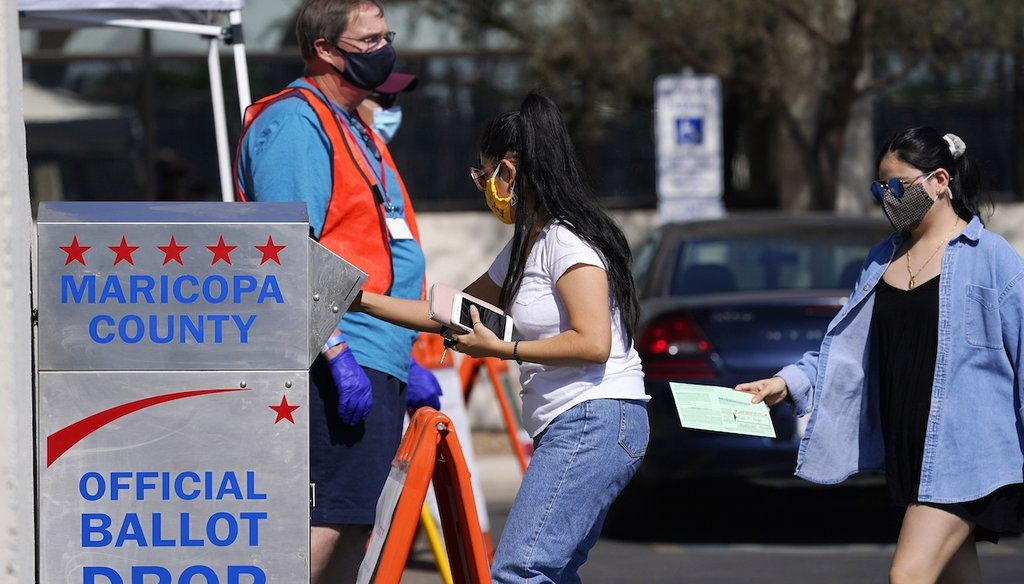Stand up for the facts!
Our only agenda is to publish the truth so you can be an informed participant in democracy.
We need your help.
I would like to contribute

Voters drop off ballots as volunteers look on at the Maricopa County Recorder's Office on Oct. 20, 2020, in Phoenix. (AP)
If Your Time is short
-
Voting by mail has existed in Arizona for more than a century. In 1991, the state Legislature established no-excuse absentee voting that allowed any voter to cast a ballot by mail.
-
In the 2020 election, about 89% of voters cast ballots early – some in person, but largely by mail.
-
Republicans have now filed a lawsuit asking the Arizona Supreme Court to either declare voting by mail unconstitutional, or end the no-excuse policy. Restrictions are being considered in the state Legislature as well.
In 1991, the World Wide Web was in its infancy, the Soviet Union collapsed and Madonna topped the charts. In the world of Arizona politics, the year marked the beginning of expansive voting by mail.
Three decades later, the Arizona Republican Party wants to get rid of voting by mail, despite the fact that it has been widely used by both Democrats and Republicans.
The Arizona Republican Party filed a lawsuit Feb. 28 asking the state Supreme Court to either declare voting by mail unconstitutional, or scale it back by requiring voters to have an excuse such as being out of town. The lawsuit names as defendants both the state and Secretary of State Katie Hobbs, a Democrat running for governor.
Republicans are seeking a court ruling before the Nov. 8 general election that includes races for governor, secretary of state and U.S. Senate.
If the lawsuit succeeds, it would be a massive shift in the way most voters cast ballots in the battleground state where voting in person on Election Day is the exception, not the norm.
Sign up for PolitiFact texts
About 89% of voters in 2020 cast ballots before Election Day for the presidential election. As of the November 2020 election, three of every four Arizona voters were on a permanent list to get a mail ballot in every election.
We looked back at the history of voting by mail in Arizona and found that it had widespread bipartisan support — until former President Donald Trump and his allies spread falsehoods about voting by mail and his challenger, Joe Biden, won Arizona.
Voting by mail has existed in Arizona for a century
In 1918, absentee voting was established only for active military personnel, according to a history compiled by Susan Leach-Murray, a librarian for the State of Arizona Research Library. Three years later, the state expanded absentee voting to voters who would be out of town on Election Day.
Over the next few decades, absentee voting was expanded to include those with disabilities or people who were at least 65 years old.
The biggest change came in 1991, when the state Legislature passed a law that stated any voter could cast an absentee ballot. At the time, only a few other states offered no-excuse voting by mail.
County recorders from both political parties broadly supported the change, said Helen Purcell, a Republican and former longtime Maricopa County recorder.
Republicans saw it as a tool to turn out older voters, especially retirees, said Chuck Coughlin, who worked for multiple GOP campaigns, including that of former Gov. Jan Brewer.
"The idea was to give those people an easy way to participate in civic life out here, and that was thought to be a positive thing at that time, and it was and is," said Coughlin, CEO of HighGround consulting firm. (Coughlin is now a "party not declared" voter.)
In 2007, the state created a permanent early voting list so that voters could automatically get a mail ballot for each election.
"It worked like a charm for years," said F. Ann Rodriguez, a Democrat and Pima County recorder who retired after the 2020 election. "It's been very successful."
But then things changed in 2020.
In 2020 Trump and his allies spread falsehoods
A central falsehood of Trump’s 2020 campaign was that he said Democrats were sending out millions of mail ballots to rig the election against him, a statement we rated Pants on Fire.
In one speech in Arizona, Trump said "absentee" ballots were fine – for example, for himself in Florida. (Trump voted by a mail ballot for primaries in 2020 and then in person early for the general election.) But most of Trump’s statements about voting by mail portrayed it as a criminal enterprise, or suggested it was better to vote in person.
"Remember the old fashioned days when you’d actually go out and vote, today they send you millions of ballots," Trump said in October 2020 to Tucson.
Trump’s bad-mouthing of voting by mail actually helped Democrats in Arizona effectively use voting by mail, Coughlin said: "It was the first time Democrats outperformed Republicans in the history of early ballots." Biden won Arizona by about 10,500 votes, flipping the state after Trump won it in 2016.
David Wells, a lecturer in American politics at Arizona State University, said falsehoods by Trump and pundits about the security of voting by mail had an impact.
"Most Republicans are used to voting by mail, they like to vote by mail but feel more conflicted about it after hearing all the voices from Republican leadership," Wells said.
The Associated Press in December 2021 published one of the most sweeping investigations into voter fraud cases in six battleground states by contacting hundreds of local and state officials.
In Arizona, the AP found authorities were investigating 198 possible fraud cases out of nearly 3.4 million votes cast. But most of those investigations were in Pima County, and in January prosecutors later said that their probes resulted in zero charges.
After Trump lost, he continued to make false claims about mail ballots and the election in Arizona.
After 2020, Republicans pushed to curb or eliminate voting by mail
The falsehoods about the election have led to a push by some state Republicans to curb voting by mail.
One proposed bill, which hasn’t moved forward, would require all voting on Election Day, getting rid of the early voting period which includes voting by mail. State Rep. Mark Finchem, Trump’s endorsed candidate for secretary of state, is one of the co-sponsors.
In 2021, the state Legislature passed a law to make it easier to remove voters from the permanent early voting list starting in 2027 if they don’t vote by mail in at least one election within two consecutive election cycles.
Arizona voters will decide in November if they want to require people casting ballots by mail to submit their ID information as well, such as their driver’s license numbers or the last four digits of their Social Security numbers.
The Arizona Republican Party has filed a lawsuit asking the state Supreme Court to get rid of voting by mail, or at least return to pre-1991 rules when voters needed an excuse to cast an absentee ballot. The lawsuit also seeks to declare ballot drop boxes illegal.
The lawsuit argues that since the state Constitution repeatedly mentions voting "at the polls" then voting by mail is illegal. The lawyers have cited a 2005 report co-written by former President Jimmy Carter that stated, "Absentee ballots remain the largest source of potential voter fraud." But the report called for further study of absentee voting, and in 2020 Carter urged an expansion of voting by mail.
Whether and how voting by mail is permitted is a question of state law, said Paul Bender, an Arizona State University law professor. While the state Constitution contains language that assumes voting will take place in person on Election Day, that was the practice in 1912, the year the Constitution was written.
"But the Constitution also expressly gives the Legislature broad power to implement the right and ability to vote and does not expressly prohibit mail-in voting," Bender said.
Coughlin’s firm, HighGround, polled voters in March 2021 and found that about 65% of the electorate opposed eliminating absentee voting. However, support for getting rid of absentee voting was highest among Republicans – 59% supported getting rid of voting by mail.
That survey was conducted at a time when falsehoods about voting were frequently in the media due to the Republican state senate’s review of ballots cast in Maricopa County. Republican support for getting rid of absentee voting has probably since declined, said Paul Bentz, senior vice president of HighGround.
Both Purcell and Coughlin said getting rid of Arizona’s longtime voting by mail would be short sighted for both parties.
"This is the way people want to vote," Purcell said. "They have become accustomed to it."
RELATED: Facebook post wrongly says Pennsylvania mail-ballot court ruling means Biden lost
RELATED: Much has changed since Jimmy Carter’s report on fraud in mail voting
RELATED: All of our fact-checks of claims about Arizona
PolitiFact researcher Caryn Baird contributed to this article.
Our Sources
Arizona Supreme Court, Arizona Republican Party vs Katie Hobbs, Feb 2022
Davillier Law Group, Press release about lawsuit, Feb. 28, 2022
State Library of Arizona, We’ve got this: 100 years of Arizonans voting by mail, Oct. 15, 2020
Arizona laws, Session 1991
Arizona Republic, Arizona Supreme Court should declare early voting unconstitutional, state Republican Party says in lawsuit, Feb. 28, 2022
AP, GOP lawsuit looks to throw out absentee voting in Arizona, Feb. 28, 2022
Arizona Republic, Voting by mail is a tradition in Arizona. This is how that happened and why it matters, Sept. 14, 2020
AP, GOP lawsuit looks to throw out absentee voting in Arizona, Feb. 28, 2022
The Arizona Republic, End early voting? Yeah, that'll go over well, Oct. 14, 2021
Arizona Mirror, Early ballot voter ID measure will be on the November ballot, March 1, 2022
State Politics and Policy Quarterly, Daniel R. Biggers, Yale University and Michael J. Hanmer, University of Maryland, Who Makes Voting Convenient? Explaining the Adoption of Early and NoExcuse Absentee Voting in the American States, 2015
NPR, In Texas, thousands of mail ballots were rejected following new ID requirements, March 16, 2022
PolitiFact, Donald Trump says Joe Biden can only win by a 'rigged election.' That's wrong in several ways, Aug. 24, 2020
PolitiFact, Biden's statement on Trump's 2020 mail voting is Half True, Jan. 13, 2022
Telephone interview, Roy Herrera, Democratic lawyer, March 11, 2022
Email interview, Chuck Coughlin, CEO and President of HighGround, Inc., March 11, 2022
Email interview, Paul Bentz, senior vice president of HighGround, Inc. March 16, 2022
Telephone interview, Helen Purcell, former Maricopa County recorder, March 14, 2022
Telephone interview, F. Ann Rodriguez, former Pima County Recorder, March 11, 2022
Email interview, Leslie M. Hoffman, Yavapai County Recorder, March 10, 2022
Email interview, Sophia Solis, Arizona Secretary of State spokesperson, March 8, 2022
Email interview, Megan Gilbertson, Maricopa County Elections Department spokesperson, March 9, 2022
Telephone interview, David Wells, guest lecturer in political science at Arizona State University, March 15, 2022
Email interview, Paul Bender, Arizona State University law professor, March 11, 2022






































